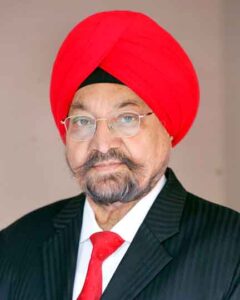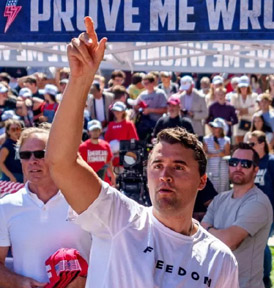
On September 10, 2025, America once again confronted its ugliest truth. Charlie Kirk, the conservative commentator and youth organizer, was gunned down in broad daylight while speaking at Utah Valley University. A sniper’s bullet—delivered from nearly 200 yards away—silenced him mid-sentence. In an instant, what was meant to be a campus debate about free speech became another entry in America’s expanding ledger of politically motivated bloodshed.
We mourn, we rage, we ask the usual questions. But deep down we already know the answers. We know why this keeps happening. Guns are too freely available. Violence is tolerated, even glorified. Leaders posture about peace, but their actions reveal an obsession with war—both abroad and at home.
The killing of Charlie Kirk should have been a jolt to America’s conscience. Instead, it risks becoming one more incident in a nation that has normalized the abnormal. Every week brings another headline: a school classroom turned into a morgue, a nightclub riddled with bullets, a church defiled by gunfire. And now, a political assassination at a university campus.
The scale of American gun violence is staggering. In 2023 alone, there were 46,278 gun-related deaths—more than the number of U.S. soldiers killed in the entire Vietnam War. That year, 80% of murders in the United States involved guns. By mid-2025, America had already endured over 300 mass shootings, claiming more than 300 lives and leaving over 1,300 wounded. Every single day, 125 Americans are killed with guns, while 200 more are shot and survive, often with life-altering injuries.
No other developed democracy tolerates this. In Japan, the average annual gun death toll can be counted on one hand. In the United Kingdom, fewer people die by firearms in a year than in a single violent weekend in Chicago. Yet America, wrapped in romantic myths of cowboys, militias, and frontier heroes, continues to treat gun violence as the “price of freedom.”
This obsession with violence does not stop with domestic gun culture. It is mirrored, even amplified, at the highest levels of leadership. Consider the symbolism: in 1949, American legislators wisely renamed the “Department of War” the Department of Defense, signaling to the world that the nation’s posture was not conquest but protection. That shift represented democratic maturity—the recognition that peace, not endless war, ought to be the organizing principle of a modern republic.
And yet in 2025, President Donald Trump restored the old title: Department of War. The change was not just semantic. It was a declaration that America would once again define itself by its capacity to wage war, not its responsibility to preserve peace. The renaming spits in the face of the legislative wisdom that tried, however imperfectly, to steer the nation away from perpetual conflict.
It also exposes a breathtaking hypocrisy. America’s leaders—Democrat and Republican alike—love to talk about peace, diplomacy, and human rights. They fly across the world to deliver lofty speeches at the United Nations. They crave recognition, even the Nobel Peace Prize. Yet their budgets tell another story. In 2024, the U.S. spent $916 billion on its military—more than the next ten countries combined. Contrast that with the paltry sums devoted to curbing gun violence at home, or to addressing poverty, education, and healthcare.
It is a peculiar kind of blindness: the nation that preaches peace abroad but cannot stop killing itself at home.
Time and again, American presidents have styled themselves as peacemakers while presiding over death. Theodore Roosevelt won the Nobel Peace Prize for brokering the end of the Russo-Japanese War, even as he celebrated the projection of American military power. Woodrow Wilson won for championing the League of Nations, even though his administration brutally suppressed dissent at home. Barack Obama accepted the Nobel Prize less than a year into his presidency—while simultaneously authorizing drone strikes that killed civilians in Pakistan and Yemen.
And now, we see leaders obsessed with restoring the language of war, not peace. It is difficult to reconcile their hunger for honors with their indulgence of violence. How can a president who renames the Department of Defense back to the Department of War claim to desire peace? How can lawmakers who take millions from the gun lobby claim to care about the safety of children in schools?
At the root of America’s paralysis is the stranglehold of the gun industry and its political enablers. The National Rifle Association and allied lobbies pour tens of millions of dollars into election campaigns, ensuring that meaningful reform dies in committee before it can ever reach the president’s desk. For them, blood is currency. Every mass shooting is an opportunity to sell more guns. Every political stalemate ensures more profit.
It is not just Republicans who are complicit. Democrats, too, have failed to act boldly, often content with half-measures that leave the underlying epidemic untouched. The result is a bipartisan failure—a government too timid, too compromised, or too corrupted to confront the crisis head-on.
The truth is simple: guns are not sacred. They are not the foundation of liberty, nor the guarantor of democracy. They are tools of destruction, fetishized by a culture that confuses violence with strength. It is time to break the romance. To admit that the free availability of guns is not only unnecessary but actively harmful to the nation.
Durable peace—at home and abroad—will never be achieved through the barrel of a gun. It will be achieved by rejecting the mythology of war, by refusing to let the gun lobby dictate national policy, and by reclaiming the wisdom of those who once sought to rebrand America’s war machine as a defensive shield, not a sword of conquest.
The killing of Charlie Kirk is not just another tragedy—it is a warning. A nation that allows political violence to flourish, which tolerates school massacres, which glorifies war while speaking of peace, is a nation on the path to self-destruction.
To the gun lobby, I say: stop hiding behind the Constitution while you cash in on death. To political parties, I say: put America before your lust for campaign dollars. To American leaders, I say: if you truly want to be remembered as peacemakers, then stop renaming departments, stop glorifying war, and start building a society where children, students, and political figures alike can live without fear of being gunned down. Save America. Save Americans from Americans. And save peace from those who dare to speak its name while waging war against it.

Leave a Reply